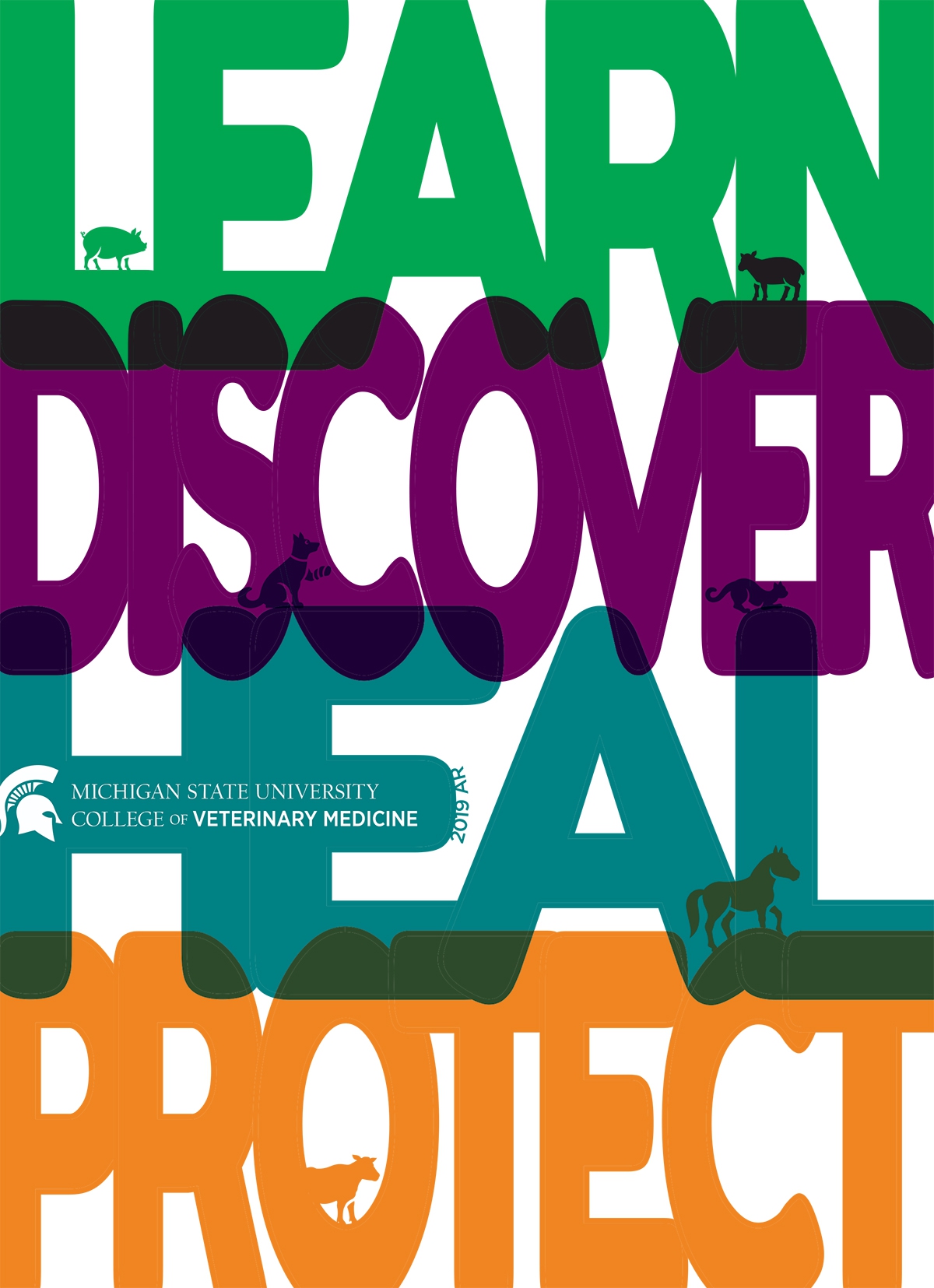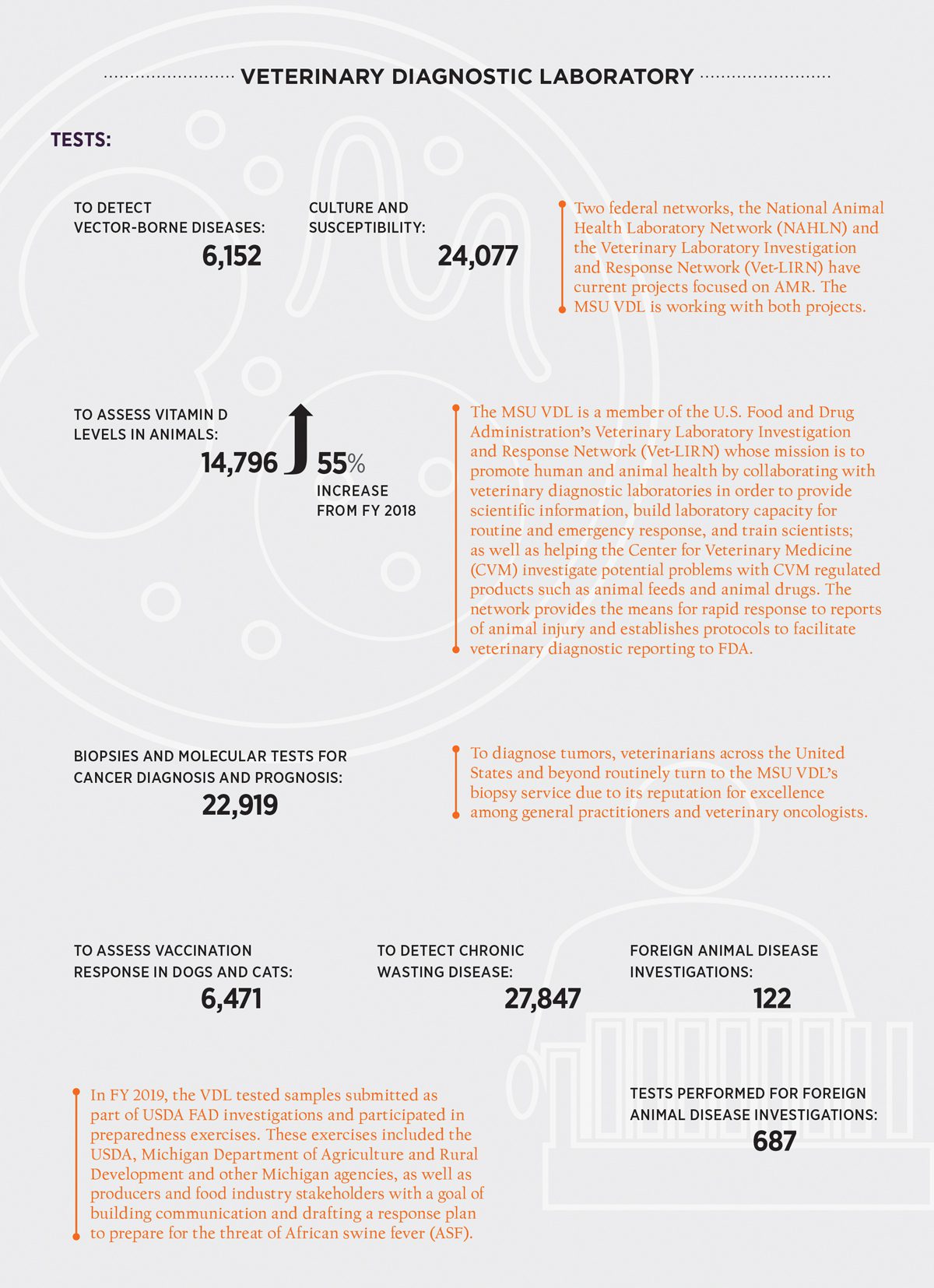

From the thousands of animals treated by faculty, staff, and students each year and ground-breaking developments in understanding genetic causes of disease, to ensuring a safe and healthy food source for families throughout the country, the College plays a vital role in guaranteeing a healthy future for our state, our nation, and our world.
This annual report summarizes my first fiscal year here at the MSU College of Veterinary Medicine. We have made some outstanding accomplishments, and these data reflect not only our individual achievements, but our community’s commitment to our mission. That mission—to Learn, Discover, Heal, and Protect—is the daily driver for everyone in the college.
Our mission was drawn from the core components of the College: Learn, for our veterinary medicine, veterinary nursing, and graduate students who will leave our walls and show the world what it means to be a Spartan veterinary professional, as well as the faculty who show them the way and the staff who support and guide them; Discover, for our many researchers, their laboratory teams, and our endowed chairs who spend their time investigating tomorrow’s scientific, medical, and surgical advancements to benefit human, animal, and environmental health; Heal, for our board-certified clinicians, residents, interns, veterinary nurses, and Hospital staff who give their all each day to save and improve the lives of pets and farm animals; and Protect, for the scientists and staff at the Veterinary Diagnostic Laboratory who defend human and animal populations against disease, food safety concerns, and other health risks.
Our mission is powered by our people, and that includes you. Our community—locally, nationally, and around the world—gives us the support and purpose we need to champion each day as veterinary professionals. This success simply would not be possible without the financial support of alumni and friends. Gifts help us attract the best and brightest students to the College, to pursue promising avenues of discovery, provide state-of-the-art care for any animal that enters our doors, and surveil and defend our communities from health risks. More than 3,500 donors supported the College this fiscal year. Those donations have, and will continue to have, tremendous impact on many more lives.
The following sections of this annual report detail our activities within each of our mission points. It is my hope that you can read and reflect on these data fondly, as I do, knowing that the difference the MSU College of Veterinary Medicine makes in this world is truly remarkable.
Birgit Puschner, dean



At the heart of everything the College does lies its commitment to students—veterinary medicine doctors and nurses who are the future of the profession, as well as graduate students who go on to affect change in key areas of research. Every faculty and staff member helps provide the best possible education for each student who walks through the College’s doors. While the curriculums are demanding, the end results are veterinary doctors, nurses, and scientists equipped and ready to champion the next stage of their careers.
The Doctor of Veterinary Medicine (DVM) Class of 2022, which began its veterinary education in the fall of 2018, is the College’s first cohort to experience holistic admissions standards and revised admission requirements. These adjustments will help these and future DVM students reduce tuition cost and overall debt; one example is that no bachelor’s degree is required of applicants, so long as they have completed the College of Veterinary Medicine’s list of prerequisites. These changes also have helped shape a more diverse College community, and those efforts have not gone unnoticed. The MSU College of Veterinary Medicine was awarded the 2018 Insight Into Diversity’s Higher Education Excellence in Diversity (HEED) Award, which recognizes colleges and universities that demonstrate an outstanding commitment to diversity, equity, and inclusion. Insight Into Diversity is an organization recognized as a leading voice in diversity, equity, and inclusion for the past 40 years.
“We are extremely honored to have received this award,” says Dr. Hilda Mejia Abreu, associate dean of Admissions, Student Life, and Inclusivity. “Our College community is dedicated to nurturing a diverse, equal, and inclusive community of learners, and this award is evidence of our work and commitment.”
Along with being some of the best and brightest in the next generation of veterinarians, the College’s incoming DVM Class of 2024 also received more than $1.5 million in scholarships, a 15.6 percent increase since last year.
Our College community is dedicated to nurturing a diverse, equal, and inclusive community of learners.
Dr. Hilda Mejia Abreu
Associate Dean
Admissions, Student Life, and Inclusivity
“Scholarships are key, not only in positively affecting our students’ educational experiences while they’re here with us, but in their quality of life after they graduate,” says Lauren Brown, recruitment, admissions, and scholarships counselor for the College. “Veterinary medical student debt is some of the heaviest, so every dollar makes a huge impact on our students.”
The DVM Program isn’t the only one to undergo a transformative year. Shortly after celebrating its 50th anniversary, the College’s Veterinary Technology Program made an important change. Currently, there is a nation-wide movement to change the title of “licensed veterinary technician” to “registered veterinary nurse,” a move which more accurately reflects the expertise and skill demanded of these professionals. This is more than a surface-level name change; the national movement aims to unify the profession under a single credential and to standardize the scope of practice and credentialing standards throughout the country. The College’s renamed Veterinary Nursing Program will continue to deliver top-notch education to its graduates while underscoring its commitment to shaping the future of the profession while ensuring the highest caliber of care for patients and animal owners. To top it off, the Program received full accreditation renewal from the American Veterinary Medical Association Committee on Veterinary Technician Education and Activities (CVTEA). This recognizes the high standards the College’s Veterinary Nursing Program has long held and continues to meet.


We strive to empower our students, and one of the best ways we can do that is by working hard to remain at the forefront of education. We are dedicated to the creation of highly sought-after, careerready graduates who exceed expectations.
Taylor Epp
Director
Veterinary Nursing Program
“We strive to empower our students, and one of the best ways we can do that is by working hard to remain at the forefront of education,” says Taylor Epp, director of the Veterinary Nursing Program. “We are dedicated to the creation of highly sought-after, career-ready graduates who exceed expectations.”
The College also is home to nearly 60 graduate students who join its Comparative Medicine and Integrative Biology (CMIB) Program from across the globe. These students participate in highly interdisciplinary research that addresses human and animal health at the molecular, cellular, and organismal level. The skills and knowledge gained from CMIB will aid these students in addressing the growing national and global need to translate advances in biomedical sciences into the prevention and treatment of diseases in humans and animals.
“Our goal is to develop well-rounded scientists who will become the next generation of leaders in biomedical research, regulatory agencies, public policy, clinical practice, and public health,” says Dr. Colleen Hegg, director of CMIB and associate professor for the College.
No matter the program or professional goal, the MSU College of Veterinary Medicine has a long history of producing top-tier graduates who go on to represent the College in positive, impactful, and memorable ways that show what it means to be a Spartan veterinary professional.


For the MSU College of Veterinary Medicine to offer a top-tier education, it must contribute to the very knowledge that it teaches to students. Researchers here touch a variety of disciplines—from the basic sciences to agriculture, to surgical innovation and pharmaceuticals. With more than $12 million in funding awards this year from sponsors like the National Institutes of Health, the United States Department of Agriculture, and the Food and Drug Administration, the MSU College of Veterinary Medicine’s Office of Research impacts human, animal, and environmental health at home and around the world.
This year, some of the College’s most exciting research came from Dr. Adam Moeser, Matilda R. Wilson Endowed Chair in Large Animal Sciences and associate professor for the College. Moeser leads the Gastrointestinal Stress Biology Laboratory, where his research centers on the pathophysiology of stress-induced gastrointestinal disorders. His research is focused on how exposure to high levels of stress or adversity in early life increases lifelong risk for GI and immune disorders of people and animals. In April 2019, Dr. Moeser received a three-year grant from the United States Department of Agriculture to study how biological sex (i.e. being male or female) influences the activity of specific immune cells called mast cells, which play an important role in stress-related GI diseases, as well as how biological sex and early-life stress interact to drive inflammation later in life.
This past fiscal year, Moeser published a paper in the Journal of Allergy and Clinical Immunology (JACI), which is a high-impact journal. In this paper, Moeser dives further into
the mysteries of common diseases and disorders like irritable bowel syndrome (IBS), migraines, allergies, and other immune-triggered conditions caused by an overreaction of the immune system. He also was selected by the College as the recipient of the 2019 Zoetis Award for Research Excellence. This award is a nationally recognized honor for a faculty member at each veterinary school in the United States. It acknowledges researchers whose innovative studies have advanced the scientific standing of veterinary medicine.

WITH MORE THEN $12 MILLION IN FUNDING AWARDS THIS YEAR, THE MSU COLLEGE OF VETERINARY MEDICINE’S OFFICE OF RESEARCH IMPACTS HUMAN, ANIMAL, AND ENVIRONMENTAL HEALTH AT HOME AND AROUND THE WORLD.
Dr. Ángel Abuelo, assistant professor in Cattle Health and Wellbeing, is another of the College’s large animal researchers. He is a dairy specialist veterinarian by training whose primary research focus is the interaction between nutrition and the immune system of neonatal dairy calves. In particular, he is studying how different nutritional interventions can improve the immune responses of calves and increase their resistance to diseases.
Abuelo’s recent research includes his work with Dr. Lorraine Sordillo, the College’s Meadow Brook Endowed Chair in Farm Animal Health and Wellbeing. Together, they’re working to ramp up calves’ immune systems so earlier vaccination may be more effective; this could help lower rates of illness and death in newborn calves. Abuelo also has begun work in partnership with the Cornell University College of Veterinary Medicine on a grant from the United States Department of Agriculture to increase the number of rural bovine veterinarians, of which there is currently a severe shortage across the country.
“Dr. Moeser, Dr. Abuelo, and all our researchers here at the College are hard at work to address serious issues in human, animal, and environmental health,” says Dr. Srinand Sreevatsan, associate dean of Research and Graduate Studies. “Their discoveries have true and tangible impact on the world.”

Dr. Moeser, Dr. Abuelo, and all our researchers here at the College are hard at work to address serious issues in human, animal, and environmental health. Their discoveries have true and tangible impact on the world.
Dr. Srinand Sreevatsan
Associate Dean
Research and
Graduate Studies
It’s this impact that drives the MSU College of Veterinary Medicine’s continuous and dedicated research. The College’s discoveries—those past, present, and yet to come—are a constant reminder of the value provided by Spartan scientists.

Perhaps the most tangible piece of the MSU College of Veterinary Medicine’s mission is that with which the public is most familiar. When people think of veterinarians, many automatically envision a doctor, much like their own, with a stethoscope or surgical tools, ready to save the day.
This is a common sight at the MSU Veterinary Medical Center, where there are board-certified clinicians, residents, interns, and veterinary nurses (licensed veterinary technicians) who work within more than 20 medical and surgical specialty services. This past fiscal year, the Hospital treated more than 31,000 cases. One of the most memorable was Stella, the two-year-old Rottweiler house fire victim. Her burn injuries were healed using descaled cod skin grafts, which were produced, manufactured, and donated by Kerecis of Iceland; this was the first-ever use of these grafts on an animal patient.
“Kerecis stepped in and helped us serve a family they didn’t know, who was half-a-world away from them,” says Brea Sandness, surgical resident at the MSU Veterinary Medical Center. “That’s what being a Spartan is all about.”
The Hospital’s clinical success isn’t just due to its people, though. It also requires top-of-the-line facilities and equipment. The Hospital upgraded to a new linear accelerator—the Varian Trilogy—which allows for stereotactic radiation, plus intensity-modulated radiation therapy; three-dimensional conformational radiation therapy; clinical treatment plans; state-of-the-art, image-guided radiation therapy; and RapidArc therapy.
These improvements—whether equipment or infrastructure—make a noticeable difference in the clinical options we can offer and the experience our patients and their owners have while they visit us.
Dr. Chris Gray
Director
MSU Veterinary Medical Center
In addition, various other areas throughout the Hospital were remodeled and updated. “These improvements—whether equipment or infrastructure—make a noticeable difference in the clinical options we can offer and the experience our patients and their owners have while they visit us,” says Dr. Chris Gray, director of the MSU Veterinary Medical Center.
The Veterinary Medical Center’s reach isn’t limited by its walls. Two members of our team—Dr. Marie Hopfensperger, head of Behavior Services for the Hospital and assistant professor for the College, and Megan Spedoske, licensed social worker and head of Veterinary Social Work for the Hospital—and their partner Tana Fedewa, licensed social worker and director of the MSU Center for Survivors, were selected for the Robert Wood Johnson Foundation Clinical Scholars Leadership Program, which supports innovative healthcare programming and invests in the leadership development of its Clinical Scholars. The MSU team was selected for their project Justice Heals, an animal-assisted intervention for sexual assault survivors and shelter dogs.



Two members of the Hospital’s team were selected for the Robert Wood Johnson Foundation Clinical Scholars Leadership Program, which supports innovative healthcare programming and invests in the leadership development of its Clinical Scholars.
The MSU team was selected for their project Justice Heals, an animal-assisted intervention for sexual assault survivors and shelter dogs.
“The Justice Heals team has shared beliefs in the human-animal bond and the resiliency of survivors,” says Hopfensperger. “Our programming is designed to create a shared healing journey for survivors and shelter dogs, and we look forward to our first cohort working together.”
The Hospital’s service heads aren’t the only ones furthering their education. As a teaching hospital, educating the next generation of veterinarians is a major component of the Hospital’s mission to Heal. Students at the Hospital had an extra learning opportunity this year thanks to Dr. Elizabeth Carr, large animal internist and acupuncturist for the Hospital and associate professor for the College, and Dr. Sarah Shull, head of the Rehabilitation Service for the Hospital and assistant professor for the College, who partnered with CuraCore to offer 12 online modules followed by a week-long clinical intensive course to earn certification in Medical Acupuncture for Veterinarians.
“Students graduating with this certification will be able to put this knowledge into practice,” says Shull. “They can integrate these skills into their careers, whether they go on to practice, research, or educate.”
Students graduating with this certification will be able to put this knowledge into practice. They can integrate these skills into their careers, whether they go on to practice, research, or educate.
Dr. Sarah Shull
Service Head of Rehabilitation Services
MSU Veterinary Medical Center
Each year, the MSU Veterinary Medical Center receives new cases, and each case is one more opportunity for the clinicians, residents, interns, nurses, students, and staff to show its community what being a Spartan veterinary professional is all about. Being known for top-tier diagnostics, treatments, and preventatives is only half the battle; it’s the Hospital’s people who put the power in its mission to Heal—every single day.

Veterinary medicine touches every human and animal—whether they know it or not. Outside of the clinic, diagnostic specialists are hard at work evaluating, processing and performing assays on samples submitted by veterinarians to provide the diagnoses needed to identify the cause of animal disease and to confirm wellness for healthy animals. In addition, these specialists also are watching out for the next big disease outbreak and serve as a source of information for pet owners, farmers, and everyday citizens.
The Michigan State University Veterinary Diagnostic Laboratory is a state laboratory that works to protect animal and human health at home and across the globe. The Laboratory is trusted by its clients for core diagnostics, innovative solutions, and expert service. The Laboratory receives samples from all 50 states including Washington, DC; US territories; and 26 foreign countries.
“Our Laboratory has eight sections, each of which plays a key role in helping veterinarians to assess the health status of livestock, poultry, horses, and wildlife, as well as companion, exotic, and zoo animals. The Laboratory is also positioned to assist with surveillance, defense, and action in the midst of a health crisis,” says Dr. Rachel Reams, director of the MSU Veterinary Diagnostic Laboratory. “We’re ready to protect, investigate, educate, and collaborate for the safety of our animal and human populations.”
This past year, the Laboratory addressed key threats to animal and human health. One of those threats is vector-borne disease like Lyme disease and West Nile virus, which are spread by insects and ticks. The Laboratory performs tests for many vector-borne diseases that can infect companion animals, livestock, and wildlife. Another threat to human and animal health is anti-microbial resistance (AMR). In its mission to Protect, the Laboratory routinely tests samples collected from clinically ill animals for bacterial pathogens, and often performs antibiotic susceptibility testing on isolated pathogens to determine which antimicrobial agents potentially will be most effective. This is essential to ensuring successful treatment and reducing or preventing the development of AMR in bacteria.
Our Laboratory has eight sections, each of which plays a key role in helping veterinarians to assess the health status of livestock, poultry, horses, and wildlife, as well as companion, exotic, and zoo animals. The Laboratory is also positioned to assist with surveillance, defense, and action in the midst of a health crisis. We’re ready to protect, investigate, educate, and collaborate for the safety of our animal and human populations.
Dr. Rachel Reams
Director
MSU Veterinary Diagnostic Laboratory
In addition to clinical diagnostic testing, the Laboratory also takes preparatory defensive steps against potential health risks by testing for disease surveillance and preparing for animal disease outbreaks through continuous preparation and training. Chronic wasting disease (CWD) is a fatal central nervous system disease found in captive and free-ranging cervids like deer, elk, and moose. The Laboratory’s ability to test for CWD has proven valuable to the Michigan Department of Natural Resources’ increased surveillance after a free-ranging, white-tailed deer was positively confirmed with CWD in 2015.
The Laboratory also partners with federal and state agencies to prepare for foreign animal diseases (FADs) that threaten animal agriculture. One of these diseases, African swine fever (ASF), is a viral disease that affects both domestic and wild pigs. It is both highly contagious and deadly, with a fatality rate of up to 100 percent. Recent outbreaks in Asia have led to a sharp decline in pork production, and there is no treatment or vaccine for ASF. This further highlights MSU’s important defensive and preparative work and underscores the Laboratory’s role in maintaining healthy animal populations to protect human food supplies.
In addition to wild and food animal health concerns, the Laboratory also supports beloved family pets. During this fiscal year, nationwide pet food recalls due to significantly elevated levels of vitamin D resulted in a surge of testing to assess vitamin D levels in animals. The MSU Veterinary Diagnostic Laboratory is one of the few laboratories that offers this testing and is trusted by clients due to its widely respected Endocrinology Section.


THE TESTS RUN EVERY DAY BY THE MSU VETERINARY DIAGNOSTIC LABORATORY CAN MEAN THE DIFFERENCE BETWEEN LIFE AND DEATH FOR AN ANIMAL OR AN ENTIRE POPULATION.
According to the American Veterinary Medical Association, approximately 1 in 4 dogs will develop neoplasia—benign or malignant—and almost half of dogs older than the age of 10 will develop cancer. The expertise and insight offered by the Laboratory’s pathologists, who integrate traditional pathology endpoints with advanced molecular diagnostics, assist in the diagnosis and prognosis of cancer in pets. This allows referring veterinarians to help pet owners ensure quality of life for their animals.
Concerns about and resistance to vaccination have become widespread in both human and veterinary medicine. The Laboratory identifies the presence and amount of antibodies in an animal’s blood to demonstrate proper immune response in puppies and maintenance of post-vaccinal serum antibody levels in adult animals. This testing also can help manage infectious disease outbreaks in shelters and kennels by identifying animals with no or low antibody levels.
While the art and science of veterinary medicine centers around animals, its impact is much broader. The tests run every day by the MSU Veterinary Diagnostic Laboratory can mean the difference between life and death for an animal or an entire population; in providing these and other services, the Laboratory protects animal health, which helps ensure health for humans and the environment. People and their animals can rest a little easier knowing that the Laboratory and all its Spartan veterinary professionals stand at the ready.


